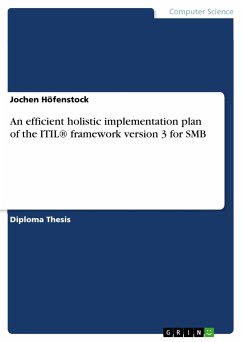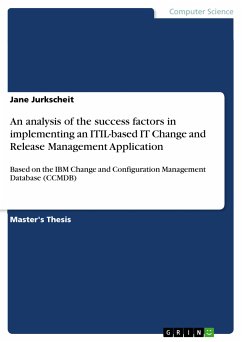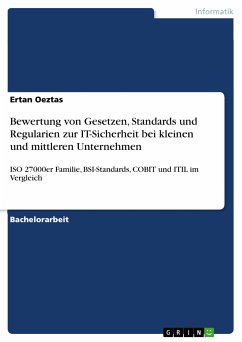Diploma Thesis from the year 2009 in the subject Computer Science - Commercial Information Technology, grade: 2, Fachhochschule des bfi Wien GmbH (Projektmanagement und Informationstechnik), language: English, abstract: The IT Infrastructure Library (ITIL) framework is a defacto standard for a holistic Service Management approach. In its third version a five stage lifecycle model provides principles, roles, processes and functions next to a plurality of information for the history of a service from the cradle to the grave. Preceding activities ensure an efficient implementation of ITIL framework for different kinds of management systems used by IT departments or service providers for small and medium-sized business (SMB). This master thesis reviews the corresponding theory of ITIL and organisational change management as well as project management methods necessary for ITIL framework implementation. Most small and medium-sized businesses rush into the implementation of ITIL framework because an essential analytic planning was not or ineffectually done. The dependences and coherences between the Service Strategy, Service Design, Service Transition, Service Operation as well as Continual Service Improvement allege how to efficiently implement the holistic ITIL framework. Based on a survey of SMBs experiences and level of organisational maturity this information gets combined and framed in an implementation plan in due consideration of all coherences and dependencies to assure optimum quality of implementation. With such a plan, SMBs are in a position to generate as much as possible achievement compared with an adequate scale of effort. SMB has also the assurance that only the appropriate parts of ITIL framework are affected for its System or Service Management approach. The chain of causation starts with a summary of all five ITIL lifecycle stages and its interfaces next to a survey of SMB’s experiences with such a framework and level of organisational maturity. It ends with an implementation plan based on the participators statements and adequate project management methods for definition of objectives, pinpointing of dependencies, object and work breakdown structures and environment analysis. My major conclusion of this master thesis is that costs saving characteristics of ITIL framework do not appear by ITIL framework implementation. They appear in case of consistent application.









